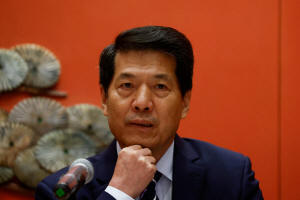|
More than 40 countries, including China, India, the United
States, and European countries, but not Russia, took part in the
Jeddah talks that ended on Sunday.
China sent its Special Envoy for Eurasian Affairs and former
ambassador to Russia, Li Hui, who in May toured six European
capitals to find common ground for an eventual political
settlement of the conflict, now in its 18th month.
Li "had extensive contact and communication with all parties on
the political settlement of the Ukraine crisis... listened to
all sides' opinions and proposals, and further consolidated
international consensus," the foreign ministry said in a written
statement to Reuters.
"All parties positively commented on Li Hui's attendance, and
fully backed China's positive role in facilitating peace talks,"
the statement said.
China will continue to strengthen dialogue based on its 12-point
peace proposal, and "accumulate mutual trust", it said, without
going into specific details.
China's attendance signals possible shifts in Beijing's approach
but not a U-turn in its support for Moscow, analysts said.
Beijing has refused to condemn Moscow for the invasion it
launched in February 2022. But it has offered its own peace
plan, which received a lukewarm response in both Russia and
Ukraine while the United States and NATO were skeptical.
The two-day meeting in Jeddah was part of a diplomatic push by
Ukraine to build support beyond its core Western backers by
reaching out to Global South countries that have been reluctant
to take sides in a conflict that has hit the global economy.
(Reporting by Laurie Chen; Editing by Muralikumar Anantharaman
and Gareth Jones)
[© 2023 Thomson Reuters. All rights
reserved.] Copyright 2022 Reuters. All rights reserved. This material may not be published,
broadcast, rewritten or redistributed.
Thompson Reuters is solely responsible for this content.

|
|




